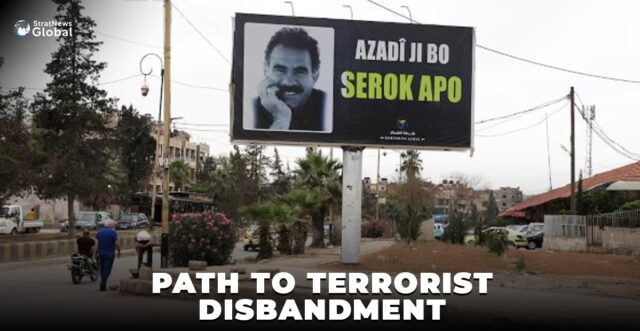Turkey is entering a difficult path to ensure the Kurdistan Workers Party (PKK) follows through on its decision to disband after 40 years of conflict, facing significant challenges in neighbouring Iraq and Syria.
Thousands of heavily armed PKK fighters in northern Iraq, where the group is based, are now expected to surrender their weapons at numerous locations across the region, with many then returning to NATO-member Turkey, according to Ankara’s plans leaked to pro-government media.
But there is also pressure on President Tayyip Erdogan’s government to take the next step on what all sides call a delicate path towards possible peace, closing a conflict that has killed more than 40,000 people since 1984.
Turkish officials have declined to comment on how the process will happen.
Disarmament Decision
The PKK and Turkey’s pro-Kurdish DEM Party, the third largest in parliament, expect Ankara to address Kurdish political demands, potentially before weapons are handed over.
After a cabinet meeting on Monday evening, Erdogan said the disarmament decision should also apply to U.S.-allied Kurdish forces in northeastern Syria that Ankara regards as part of the PKK.
In Syria, Kurdish forces head Mazloum Abdi said the PKK decision is “worthy of respect” and “will pave the way for a new political and peaceful process in the region”.
But he gave no indication of planned steps, and earlier said the PKK disarmament does not apply to his Syrian Democratic Forces (SDF), which signed a deal to join Syria’s institutions after President Bashar al-Assad’s fall in December.
The U.S. Embassy in Ankara said Secretary of State Marco Rubio called the PKK move a “turning point” and conveyed support to Turkey in a call with Turkish counterpart Hakan Fidan.
While Washington and Ankara both deem the PKK a terrorist group, the U.S. alliance with Kurdish fighters in Syria that Turkey sees as an affiliated group has frayed bilateral ties.
“Had there not been unconditional U.S. arms support for the PKK in 2014, the earlier peace process at that time could have yielded results – and the terrorist group might have laid down weapons back then,” Harun Armagan, vice chair of foreign affairs in Erdogan’s AK Party, said.
The SDF has been the main U.S. ally against Islamic State in Syria and U.S. officials have in the past distinguished between the Syrian Kurdish forces and the PKK, emphasising that their relationship is tactical and focused on counter-terrorism.
Weapons, Amnesty
The PKK launched its insurgency with the original aim of creating an independent Kurdish state. But in recent years, as it was pressed deeper into Iraq, it urged more Kurdish rights and limited autonomy in Turkey.
Baghdad and Kurdish authorities in northern Iraq are expected to play a role monitoring the disarmament process in coordination with Turkey’s MIT intelligence agency.
Iraq’s foreign ministry welcomed the PKK decision as a “positive and important step” for regional stability in a statement also apparently referring to Turkey’s long-standing military presence in Iraq to fight the PKK.
It said this was an opportunity to reconsider “the pretexts and justifications that have long been used to justify the presence of foreign forces on Iraqi soil.”
Turkish media reports said PKK terrorists descending from the Iraqi mountains will surrender their weapons in the areas of Sulaimaniyah, Erbil and Dohuk.
They said the disarmament was aimed to be completed by the summer, after which some 2,000-4,000 terrorists without Turkish criminal records will be gradually returned to Turkey, while others could head to third countries.
One columnist close to the government wrote in Hurriyet newspaper that while some 60% of those in Iraq had not committed a crime in Turkey, the top 30 people in the PKK were wanted on criminal warrants.
Turkish officials declined comment on the reports.
The PKK took its decision at a congress held in response to a February call to disband from its jailed leader Abdullah Ocalan, who has been imprisoned on an island south of Istanbul since 1999. It said on Monday that he would manage the process.
(With inputs from Reuters)





